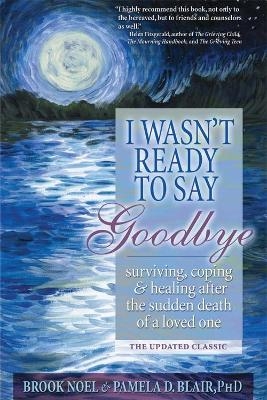
I Wasn't Ready to Say Goodbye
Sourcebooks, Inc (Verlag)
978-1-4022-1221-5 (ISBN)
The most helpful grief book to read when you're ready to start healing after the loss of a loved one.
The grief book that just "gets it." Whether you're grieving the sudden loss of a loved one or helping someone else through their grief, I Wasn't Ready to Say Goodbye offers a comforting hand to help guide you through the grieving process, from the first few weeks to the longer-term emotional and physical effects. It then reveals some of the myths of the grieving process and what really happens as you navigate through the pain.
Top-rated within grief books, topics include:
Grieving the loss of a child, partner, parent, sibling, friend, or pet
The physical and emotional effects of grief
Navigating difficult days such as holidays, anniversaries, and birthdays
Helping children cope with grief
Understanding the grief recovery process
Written by two authors who have experienced it firsthand, this book has offered solace to over one-hundred fifty-thousand people, ranging from seniors to teenagers and from the newly bereaved to those who lost a loved one years ago. An exploration of unexpected death and its role in the cycle of life, I Wasn't Ready to Say Goodbye provides those people coping with grief with a rock-steady anchor from which to weather the storm of pain and begin to rebuild their lives.
For further step-by-step support, the I Wasn't Ready to Say Goodbye Companion Workbook offers a combination of self-exploration questions, visualization activities, and journaling to help readers through the grieving process.
Praise for I Wasn't Ready to Say Goodbye:
"I highly recommend this book, not only to the bereaved, but to friends and counselors as well."- Helen Fitzgerald, author of The Grieving Child, The Mourning Handbook, and The Grieving Teen
"This book, by women who have done their homework on grief... can hold a hand and comfort a soul through grief's wilderness. Outstanding references of where to see other help."- George C. Kandle, Pastoral Psychologist
"Finally, you have found a friend who can not only explain what has just occurred, but can take you by the hand and lead you to a place of healing and personal growth...this guide can help you survive and cope, but even more importantly... heal."- The Rebecca Review
"For those dealing with the loss of a loved one, or for those who want to help someone who is, this is a highly recommended read."-Midwest Book Review
Brook Noel is a CEO, author, speaker, and mom. She has been featured in hundreds of shows and magazines, including ABC World News, CNN Headline News, and Fox & Friends. She is the author of Good Morning, I Wasn't Ready to Say Goodbye, The Change Your Life Challenge, and other books. She lives in Wisconsin.
Introduction
Part One: An Unfamiliar World: The Journey into Grief
Chapter One: The Starting Point: Notes from the Austhors
Pam's Story
Brook's Story
Sudden Loss Comes Again
Chapter Two: Notes for the First Few Weeks
Treat Yourself as if You Were in Intensive Care
Expect to Be Distracted
Have Someone Near You
Accept the Help of Friends
Caring for Your Children
Someone to Take Calls and Check Email
Seek Assistance with Final Arrangements
Don't Worry about Contacting People
Let Your Body Lead You
Religious Traditions
Wills and Arrangements
Cultural Differences
Going Back to Work
Grief Sessions
A Guide for Those Helping Others with Grief
Chapter Three: Understanding the Emotional and Physical Effects of Grief
Exhaustion
Days of Distraction
Denying Our New Reality
Anger . . . a Normal Response
Grief Knows No Schedule
Physical Symptoms
Emotional Ambushes
Grief and Dreams
If You Don't Dream
If You Do Dream
Important Things to Remember on the Pathway
Feeling the Presence of the Deceased
When You Don't Feel the Presence of the Deceased
Communicating with Your Loved One (and If You Haven't)
The World Becomes Dreamlike
A Time to Withdraw
Hurtful Self-talk
Impulsive Living
Instant Replays and Obsessive Thoughts
The "If Only" Mind Game
Fear
Chapter Four: Myths and Misunderstandings of the Grieving Process
Myth #1: Death is death, sudden or long-term, and we all grieve the same way
Myth #2: By keeping busy I can lessen or eliminate my grief.
Myth #3: I must be going crazy or "losing it."
Myth #4: I will need to make sure I don't grieve for too long - one year should be enough
Myth #5: If I express my anger at God or the circumstances of thedeath, I am a bad person and will "pay" for it.
Myth #6: My friends tell me it is time to let go. Since others haveacclimated to life again, I should too
Myth#7: I must wear black for a designated time period or I willdishonor the person who died
Myth #8: I won't have to grieve as much and I will feel better if Iuse alcohol or medication to alleviate my sadness
Myth #9: If I talk about the loss of my loved one I'll feel worse
Myth #10: Shouldn't I be strong enough to "tough it out" by myself?
Myth #11: I've done something wrong because some of my family and friends are turning away from me
Myth #12: I should be relieved that they didn't suffer a long and lingering illness
Myth #13: Someday I'll have another (spouse, child, parent, lover...) and that person will erase the pain and replace what I have lost.
Myth #14: Once I am done with one stage of grief, I will simply move on to the next
Myth #15: If I relive the good times, I'll stay stuck in the pain
Myth #16: Children really don't understand death and probably don't need to be included in the funeral plans or memorial services
Myth #17: To properly honor the deceased, I must have the standard wake and burial
Myth #18: I am scared that if I grieve, I'll "get over my loss." I don't want to forget him!
Myth #19: Help, I'm stuck on instant replay. I can't get this out of my thoughts - something is wrong with me
Myth #20: This kind of thing doesn't happen in my family
Myth #21: There must be something wrong with me. I'm not crying
Myth #22: I'm not grieving right - I should be doing something differently.
Myth #23: I should feel guilty.
Myth #24: I shouldn't feel so angry
Myth#25: I'll never be happy again.
Myth#26: After a while I will no longer think or feel anything about the loss
Myth #27: In order to process my grief effectively I need to advance through the Five Stages of Grief
Myth #28: The final stage of grief requires acceptance
Part Two: The World Is Upside Down: Collecting Our Scattered Pieces
Chapter Five: The World is Upside Down
Assumptions Are Shattered
Loss of Purpose
Redefining Ourselves
What Matters Now?
Finding a Beginning, Middle, and End
Why Did This Happen?
Do We Ever Get over Grief?
Chapter Six: Relating to Others
Too Close to Home
You Are a Different Person
The Ten-Day Syndrome
Repeating the Story
Awkward Questions
Chapter Seven: Difficult Days: Holidays, Anniversaries, and More
Birthdays
Anniversaries
Weddings
Holidays
Happy New Year?
Next Year
Chapter Eight: Grieving Together: Understanding How Men and Women Grieve
Problem Solving and Facing Challenges
Processing Grief
Communicating
Different Losses, Different Worlds: When One Member of a Couple Experiences Tragedy
Masculine Grief
Guidelines for Grieving Couples
Chapter Nine: Helping Children Cope with Grief
Babies (Birth to Eighteen Months)
Toddlers (Eighteen Months to Three Years)
Young Children
Age Three to Six Years
Age Six to Nine Years
Age Nine and Older
Adolescence
Teenagers to Young Adults
Does Your Child Need Professional Help?
Grief by Proxy
General Guidelines for Helping Children
Part Three: Sharing Our Stories
Chapter Ten: Losing a Friend
Reaching for the Phone
Some Things You Can Do
Chapter Eleven: Losing a Parent
Daddy
Generation Shifts
Some Things You Can Do
Chapter Twelve: Losing a Child
Extreme Emotions
Losing an Adult Child
Your Relationship with Your Partner
For Parents with Surviving Children
Some Things You Can Do after the Loss of a Child
Chapter Thirteen: Losing a Partner
Loss of Identity
Circles of Friends
Lingering Memories and Images
Marilyn's Story
Joan's Story
Learning to Do Things Alone
Funeral Arrangements
For Widows with Surviving Children at Home
Will I Ever Love Again?
Seeking Purpose
Some Things You Can Do
Chapter Fourteen: Losing a Sibling
Being Overlooked in the Grieving Process
Double the Loss
Idealizing
Guidelines for Young Siblings
Identity through a Sibling
Birth Order
Is He Still My Older Brother?
The Hot and Cold Nature of Sibling Relationships
Grieving an Adult Sibling
Terri's Story
Some Things You Can Do
Chapter Fifteen: Fallen Heros
Limited Circles of Support
Deepened Denial
Political Challenges
Tragedy Assistance Program for Survivors
Military Losses Outside of the Public Eye
I Should Have Said
Standing with Pride
Some Things You Can Do
Chapter Sixteen: Suicde
Common Reactions to Suicide
Religion and Suicide
The Stigma
Some Things You Can Do
Chapter Seventeen: One of Many: When Tragedy Causes Multiple Deaths
Trauma
Obsessed with Revenge and Retribution
Talking to Children
Mental Health Aspects of Terrorism
Typical Reactions
Post Traumatic Stress
The Path toward Healing
Chapter Eighteen: Other Unique Challenges
The Challenge of Closure: When Our Loved One's Body Is Not Recovered
Non-Traditional Relationships
Grief Is Cumulative
When Our Darkest Hour Becomes Front-Page News
Suggestions for Dealing with Media
Part Four: Pathways through Grief
Chapter Nineteen: The Road Ahead: Understanding the Grief Journey
Themes of Grief by Year
Grief Steps
The Ten-Step Pathway
Chapter Twenty: Faith
A Fork in the Road
Anger at God
Faith Communities and Grief
What Do I Believe?
Reconnecting with God
Some Things You Can Do
Chapter Twenty-One: Self-Help and Therapy
What are Grief Therapy and Grief Counseling?
Does Anything Good Ever Come of All This?
Maggie's Story
Is It Really Possible to Transform My Grief and Pain into Creative Energy?
Journaling and Letter Writing
Self-Help Books
Frequently Asked Questions about Self-Help, Therapy, and Healing
So much change has happened in my life since the loss. How do I cope?
Chapter Twenty-Two: The Grief Recovery Process and Exercises to Guide You
Anger Exercise
Thank You Exercise
Learning through Loss
What My Loved One Has Left Me
Screaming Exercise
Defining Priorities
Coping with Guilt
Poetry
The Gratitude Journal
Calming
Visualization
Memory Books
Rituals
Chapter Twenty-Three: The Journey Continued... Parting Notes from the Authors
Brook Noel . . . October 4, 1999
Brook Noel . . . July 29, 2007
Pamela D. Blair . . . 1999
Pamela D. Blair . . . July 29, 2007
APPENDIX I
The Memorial Service
The Eulogy
A Checklist of Calls to Make
Friends Support Group Invitation
APPENDIX II: GRIEF RESOURCES AND SUPPORT
Support for Loss of a Partner
Support for Grieving Children
Support for the Loss of a Child
Support for Loss through Suicide
Internet Support for Siblings
General Bereavement Support
Other Recommended Books by Topic
BIBLIOGRAPHY
INDEX
ABOUT THE AUTHORS
| Erscheint lt. Verlag | 1.5.2008 |
|---|---|
| Sprache | englisch |
| Maße | 152 x 228 mm |
| Gewicht | 523 g |
| Themenwelt | Sachbuch/Ratgeber ► Gesundheit / Leben / Psychologie ► Psychologie |
| Geisteswissenschaften ► Psychologie ► Trennung / Trauer | |
| ISBN-10 | 1-4022-1221-6 / 1402212216 |
| ISBN-13 | 978-1-4022-1221-5 / 9781402212215 |
| Zustand | Neuware |
| Haben Sie eine Frage zum Produkt? |
aus dem Bereich


